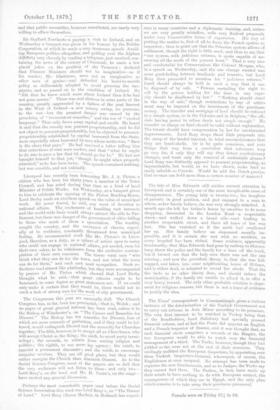Liverpool has recently been honouring Mr. 3. A. Picton, -citizen
who has been for thirty years a member of the Town Council, and has acted during that time as a kind of local Minister of Public Works. On Wednesday, at a banquet given to him to celebrate the • opening of the Picton Reading-Room, Lord Derby made an excellent speech on the value of municipal work. Ho never feared, he said, any want of devotion to national affairs. The. excitement of handling vast interests and the world-wide fame would always attract the able to Par- liament, but there was danger of the government of cities falling -to those who made of them a speculation. The wealthy sought the country, and the severance of classes, especi- ally at to residence, constantly threatened true municipal feeling. He recommended work like Mr. Picton's in Liver- pool, therefore, as a duty, as a sphere of action open to many who could not engage iu national affairs, yet needed, even for their own sakes, to be withdrawn from the exclusive contem- plation of their own concerns. The towns want men " who think what they can do for the town, and not what the town can do for them," and such men need occupation. Such re- flections read almost like platitudes, but they were accompanied by praises of Mr. Picton which showed that Lord Derby thought what ho said,—that great citizens ought to be honoured, in some degree as great statesmen are. If we could only make it certain that they would be, there would not be such a lack of strong men for the work of city government.
































 Previous page
Previous page